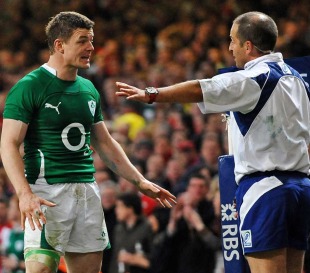|
Comment
Is rugby really a global game?
ESPNscrum Staff
March 14, 2011

Ireland's Brian O'Driscoll protests to South Africa referee Jonathan Kaplan following his decision to award Wales' Mike Phillips a controversial try during their Six Nations clash in Cardiff
© Getty Images
Enlarge
Sometimes I can't help but wonder about rugby's credentials as a global game. On Friday, for example, I watched Namibia's Welwitschias slaughtered by Western Province in a Vodacom Cup match at Newlands. It was a curtain-raiser to the Super Rugby match between the Stormers and Highlanders. Many of those Welwitschias will probably be strong contenders for their Rugby World Cup squad and yet they lost 9-56 to a WP side made up predominantly of youngsters that still represented their provincial side at under-21 level last year. Even so, Namibia will play South Africa in a World Cup pool match at Albany on September 22. Rugby writers and broadcasters will be expected to tell the world why this is a match worth watching. In truth, it will be a complete waste of time. Believe it or not, there was a time when South Africa's neighbours could actually field a respectable rugby team in the Currie Cup. Just over two decades ago South West Africa actually beat WP in a Currie Cup match at Newlands. Those were the days of classy campaigners such as wing Gerhard Mans and fly-half Shaun McCulley. I still distinctly recall listening to the radio commentary on the shock result. Then, on Saturday, I was one of millions of viewers who witnessed the gross miscarriage of justice at the Millennium Stadium, with Wales stealing a victory thanks to incompetent officiating. As Brian O'Driscoll himself said afterwards - why not just make use of the television match official? Sadly protocol does not allow it to be used in such scenarios but it would have taken a fraction of a minute to determine that the same ball that was kicked out had not been used. Instead, we end up with a situation where Wales are gifted points and the result of the game swings on that moment. If one really is serious about growing the game, how exactly can it be marketed to new audiences when there is such a blatant miscarriage of justice? For heaven's sake, this is rugby, not professional wrestling! Unfortunately I often get the impression rugby is a sport caught up in a huge comfort zone. There is a strong and loyal following, yet one has to doubt the product that is being served up globally. Technology has been part of the game for some time now, yet we can still have a situation where match officials can get a decision so badly wrong. That surely does not just say something about the match officials, but also the individuals and committees that are running the game. In the early part of Super Rugby we have seen some over-zealous refereeing - particularly at the scrums - yet what happened in Cardiff shows that the game at large apparently does not have the correct mechanisms in place for us to enjoy a fair contest. Just recently IRB chief executive Mike Miller and chairman Bernard Lapasset paid a goodwill visit to South Africa. Not only did they allow us to get our hopes up of hosting the 2023 World Cup, but some shocks were also predicted by them for the 2011 version of the tournament in New Zealand. Somehow I just don't buy that. New Zealand are getting France early enough not to choke and I'm not expecting big things from the minnows. I did, however, enjoy the opportunity of interacting with these gentlemen. I found them open to ideas and passionate about what they do. They spoke about growing the game in territories such as Russia, Georgia and the United States. The sky is indeed the limit. But if that was anything close to Namibia's World Cup team that played at Newlands on Friday, one has to wonder what the country is doing in the game's global showpiece. And how exactly do proponents of stimulating interest in rugby in new territories go about explaining what happened in Cardiff? On another subject, I have been enjoying a local competition in South Africa called the Varsity Cup. Now in its fourth year, it is played in a condensed window between university sides on Monday nights. While the standard of rugby has not been exceptional, it has generated tremendous excitement and offered great exposure to players as two matches are televised every Monday. Tiger Bax, who recently joined up with Saracens, came to prominence in the competition at the University of Cape Town. This year we have also seen the introduction of a second-tier competition in the Varsity Shield, which means there is scope for development at universities where rugby has not traditionally been strong. Now that is what I call sensible development - a concerted attempt at growing the game at an institution, coupled with investment and the obvious benefits that come with TV exposure. I'm not even joking when I say that I reckon Stellenbosch University and the University of Cape Town will both have the beating of Namibia! © ESPN Sports Media Ltd.
|
Live Sports
Communication error please reload the page.
-
Football
-
Cricket
-
Rugby
-
- Days
- Hrs
- Mins
- Secs
F1 - Abu Dhabi GP
Abu Dhabi Grand Prix December 11-131. Max Verstappen ()
2. Valtteri Bottas (Mercedes)
3. Lewis Hamilton (Mercedes)
4. Alexander Albon ()
5. Lando Norris ()
6. Carlos Sainz Jr ()
-
ESPNOtherLive >>
Golf - Houston Open
Snooker - China Open
Tennis - Miami Open

